| In
the book, Too
Big to Fail: The Inside Story of How Wall Street and Washington
Fought to Save the FinancialSystem--and Themselves , it is reported that on September 13, 2008, Larry
Fink got on the plane to Singapore. The report on the Saga
of the week of September 7-14, 2008 further commented on
his return after Henry Paulson and the government saved
the big financiers by putting trillions of dollars in the
financial system. Fink is of particular interest because
not only is he the chairman and CEO of BlackRock,� the largest
money management firm in the world, but also because his
role in the present foreclosure mess has been exposed that
he is� one of the key figures of the shadow banking system
and the shadow government is being brought to light. We
are informed in a Vanity Fair article titled �Larry Fink�s
$12 Trillion Shadow� that Blackrock controls over 12 trillion
dollars in assets, and this so-called money management firm
is �A global colossus�with $3.3 trillion in assets under
its direct management and another $9 trillion it supports.�
According to the same article, �BlackRock manages about
$1 trillion of pension and retirement funds for millions
of Americans and oversees the investments of scores of institutions
around the world: from state and local governments to college
endowments, from Fortune 500 companies to the sovereign-wealth
funds of, among others, Abu Dhabi and Singapore.� The public
record informs us that �BlackRock was founded as BlackStone
Financial Management within the private equity firm Blackstone Group
in 1988. Larry Fink,
BlackRock�s founder and CEO, joined Blackstone. Before joining
Blackstone, Fink was a managing director at First Boston,
where he pioneered the mortgage-backed
securities market in the United States.
, it is reported that on September 13, 2008, Larry
Fink got on the plane to Singapore. The report on the Saga
of the week of September 7-14, 2008 further commented on
his return after Henry Paulson and the government saved
the big financiers by putting trillions of dollars in the
financial system. Fink is of particular interest because
not only is he the chairman and CEO of BlackRock,� the largest
money management firm in the world, but also because his
role in the present foreclosure mess has been exposed that
he is� one of the key figures of the shadow banking system
and the shadow government is being brought to light. We
are informed in a Vanity Fair article titled �Larry Fink�s
$12 Trillion Shadow� that Blackrock controls over 12 trillion
dollars in assets, and this so-called money management firm
is �A global colossus�with $3.3 trillion in assets under
its direct management and another $9 trillion it supports.�
According to the same article, �BlackRock manages about
$1 trillion of pension and retirement funds for millions
of Americans and oversees the investments of scores of institutions
around the world: from state and local governments to college
endowments, from Fortune 500 companies to the sovereign-wealth
funds of, among others, Abu Dhabi and Singapore.� The public
record informs us that �BlackRock was founded as BlackStone
Financial Management within the private equity firm Blackstone Group
in 1988. Larry Fink,
BlackRock�s founder and CEO, joined Blackstone. Before joining
Blackstone, Fink was a managing director at First Boston,
where he pioneered the mortgage-backed
securities market in the United States.

BlackRock is a creature of the financial services industry and holds billions
of dollars of bonds that consist of complex financial instruments.
These are the instruments that form the basis of what is
called derivatives, the new product that is at the core
of the financialization of the economic system. This financialization
is understood to mean the vastly expanded role of financial
motives, financial markets, financial actors and financial
institutions (stock markets, etc) in the operation of domestic
and international economies. This financial sector has been
the main force behind the ideas of neo-liberalism because
these ideas ensured that they had more unregulated economic
power,�but benefitted from the protection of the state�s
military might. In this neoliberal world of militarism and
finance, oil and pharmaceuticals, the role of speculators
becomes more important than producers. Wall Street and the
New York Stock Exchange stand at the heart of this web of
finance and investment.
Companies such as BlackRock and other money management firms do not produce
anything, they speculate, gamble with the savings of millions
of persons and are in the world of make believe securities
called credit default swaps and derivatives. It is a world
where the military power of the United States is necessary
to protect the activities of these speculators.
It is to this company, BlackRock�(whose leader pioneered the mortgage backed
securities), that the US government gave the responsibility
of overseeing the toxic assets of A.I.G. and Bear Stearns,
assets that were taken over by the U.S. government to save
the system by the Bush administration in the economic �coup�
managed by Henry Paulson in 2008. As a result, �through
an array of government contracts, BlackRock has effectively
become the leading manager of Washington�s bailout of Wall
Street. The firm oversees the $130 billion of toxic assets
that the U.S. government took on as part of the Bear Stearns
sale and the rescue of A.I.G.; it also monitors the balance
sheets of Fannie Mae and Freddie Mac�which together amount
to some $5 trillion�and provides daily risk evaluations
to the New York Fed on the $1.2 trillion worth of mortgage-backed
securities it has purchased in an effort to jump-start the
country�s housing market.�
Now, with the foreclosure crisis replete with fraud and robo signing, Larry
Fink and those money managers who are tied up with the top
persons in the derivatives market are being brought up in
the news by none other than Bloomberg News for the inherent
conflict of interests in the present foreclosure crisis.
In a long article entitled, �New
York Fed Faces `Inherent Conflict' in Mortgage Buybacks,�
we learn that the New York Federal Reserve, which acquired
mortgage debt, has been calling on Bank of America to buy
back the bad debts:
�The New York Fed and big private investment firms Blackrock and Pimco
have even gone so far as to suggest that Bank of America
should be forced to buy back some portion of the loans they
originated. But this is obviously a result of the fact that
these entities hold billions worth of B of A originated
bonds and derivatives, and thus need to jump into the fray
to ensure that they don�t lose out in case their bonds actually
become worthless.�
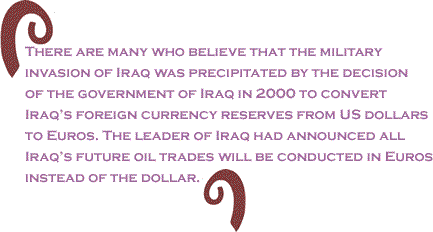
This tangled web becomes more complex when we learn that the same Blackrock
owns a large chunk of Bank of America, the bank in the US
at the center of the storm over the Foreclosure crisis.
Bank of America services over 14 million mortgages in the
USA, with a paper value of over $2.1 trillion. But this
paper value is questionable so that the bank limps on daily
basis with the knowledge that the political clout of the
financial services sector will ensure another government
bailout when the paper value turns out to be as toxic as
that which was in the hands of Bear Stearns or Lehman brothers.
Put another way, The Fed and BlackRrock are asking Bank of America to buy back
some of the loans they originated. But Blackrock owns a
large share of Bank of America. In short, the foreclosure
crisis has brought out the whole mess of securitization
that was at the heart of the financial crisis of 2008.
The fact that the banks and investment companies and the Federal Reserve Bank
of New York are all enmeshed in this cascading scandal brings
the question of finance capital away from theoretical discussion
to the reality of whether the bankers and financial oligarchs
will have their way, come what may.
Peter Fisher, presently one of the executives of Blackrock is another scion
of the toxic financial oligarchy that has moved in and out
of Blackrock and the Federal Reserve System. Formerly an
undersecretary of the treasury, Peter Fisher has also worked
for the Federal Reserve Bank of New York, where he was responsible
for all of the Federal Reserve's open market and foreign
exchange operations. Readers will remember that Tim Geithner,
the current treasury secretary, was formerly the chairperson
of the New York Fed and that it was under his watch that
the government gave Blackrock the responsibility to oversee
the toxic assets of AIG, Bear Stearns and the other fallen
speculators. The Federal Reserve System is populated with
executives who work to protect the banks and investment
firms. The history of Goldman Sachs and their deployment
of functionaries to run the government over the past thirty
years is an abject lesson of how the bankers dominated the
government of the USA. Why should all of this be of interest
to citizens all over the world? It was Thomas Jefferson
who warned that �banking institutions are more dangerous
to our liberties than standing armies.� And this is playing
out before our eyes.
Federal Reserve System
The New York Fed plays a key role in the US economy because it is owned and
managed by the financial oligarchs and is supposed to oversee
many of the biggest Wall Street bank holding companies,
including JPMorgan Chase & Co., Goldman Sachs Group
Inc., and Citigroup, etc. There are 12 regional Federal
Reserve Banks but the New York Fed is of particular importance
because this is the one branch of the Fed that oversees
the international financial system and works to protect
the dollar to ensure that the US dollar remains the currency
of international trade. This bank holds the foreign exchange
reserve of 60 per cent of the countries in the world that
are enmeshed in the dollar zone.� In other words, the New
York Federal Reserve Bank is like a central bank to many
central banks around the world.
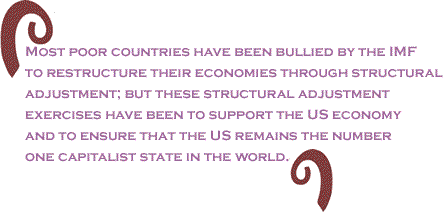
The European Union created the Euro to challenge the power of the dollar as
the currency of world trade but with the assistance of the
British and the International Monetary Fund (IMF), the US
government has been able to fend off challenges from the
Euro. Most poor countries have been bullied by the IMF to
restructure their economies through structural adjustment;
but these structural adjustment exercises have been to support
the US economy and to ensure that the US remains the number
one capitalist state in the world. The USA holds more than
60 per cent of the world�s reserves while the Euro controls
24 per cent. The other 16 percent belongs to societies such
as China, Cuba, Russia and North Korea that tenuously remain
outside of the dollar and Euro zone. It is because of the
linkages between the speculators and the dollar that the
Bank of the South has been established so
that some of these countries, such as� Venezuela and Bolivia
can delink from the dollar. There are many who believe that
the military invasion of Iraq was precipitated by the decision
of the government of Iraq in 2000 to convert Iraq�s foreign
currency reserves from US dollars to Euros. The leader of
Iraq had announced all Iraq�s future oil trades will be
conducted in Euros instead of the dollar. (See: �The
Economics behind the Iraqi Invasion� by Paul Markham).
Up till today, the US government remains vigilant as societies in OPEC threaten
to conduct oil (and other international transactions) in
Euros.
US military and the financial sector
If such a threat were carried out, it would pose a major challenge to the dominant
position of the US dollar. Slowly, Shanghai is building
up as an alternative financial sector to rival Frankfurt,
London and New York combined. It is important to underline
the reality that when the US achieved its position as the
central banker of the world after World War II, the US economy
was the strongest in the world and the US agreed to back
up the dollar by keeping one ounce of gold for every 35
dollars printed. After the US exhausted itself in Vietnam,
the US could not guarantee this fixed exchange rate so since
the 70s, the US dollar has operated at a flexible exchange
rate. In practice this means that the US government has
been able to print dollars at will and that the principal
guarantor of the US hegemonic position became the US military.
It is for this reason that there is a close relationship between capital management
firms such as the Carlyle Group and the US military industrial
complex. One way to understand the presence of US military
personnel in Europe, especially Germany is to grasp the
reality that the US fears the Euro becoming a global currency.
If the euro becomes a global currency to rival the dollar,
there would be such turmoil in the international economic
system that the effects will have permanent damage to the
US economy.
The present financial crisis is forcing the leaders of the US to either manage
the decline of the dollar gracefully or maintain the dollar
through brute force and US military bases all over the world.
Conflict of interest
When the financial services sector imploded after the days of September 2008
when the old investment houses collapsed, the real challenge
of the full restructuring of the US economy was postponed
when the government bailed out the firms with trillions
of dollars. However, the hole that was dug was so deep that
it was bottomless so that no amount of bail out could restore
the banking and money management firms to a healthy status.
It was this reality that ensured that the bankers were working
very hard to maintain this political power in the society.
That power became punctured once again as the news of the
foreclosure crisis brought to the fore the fact that the
banks and financial entities such as GMAC could be forced
to write off the losses from foreclosures (as it legally
should). If the banks and financial entities did write off
these bad loans as bad loans, the leverage of these banks
would be so far into the red that they would have no option
but to go bankrupt. Every day since September 15, 2008,
the banks have lived with this reality, and it is for this
reason that the banks must have a president in the White
House and a Congress who will again bail out these financial
intuitions when the true position of the value of the assets
becomes known.
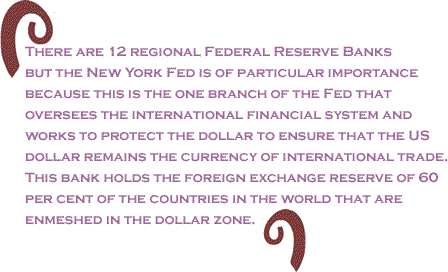
It is now clear that there is a conflict of interest between the Federal Reserve
System and the banks because the same federal reserve such
as the New York Fed and Richmond Fed hold Mortgage Backed
Securities (MBS � the ones pioneered by Larry Fink) while
acting as the agency to assure a safe and sound financial
system.
The fact that Bloomberg News and other investment sheets are writing about the
conflict of interests brings to the fore the delicate nature
of the crisis in the US financial sector. Neil Barofsky
in his report to Congress has outlined the levels of fraud
he discovered as inspector general of the Troubled Assets
Recovery Program, and has testified before Congress on the
different layers of fraud in the real estate market, in
the insurance industry, in the banks, and among all those
who were involved in the speculation that is called free
market capitalism. The struggle for the Congress is to ensure
that there are no hearings that will give voice to officials
such as Neil Barofsky and Elizabeth Warren. In fact, Warren
is feared because as the head of the new consumer agency
she would have the authority to bring out the full extent
of the manipulations of the banks.
This extent of fraud and the unhealthy nature of the US banks have been compounded
by the foreclosure crisis.
Foreclosure crisis
In most capitalist countries, a foreclosure process on a residential mortgage
begins when the home owner defaults on the payment of the
monthly mortgage. In times of economic crisis when millions
are unemployed, this foreclosure process intensifies as
millions lose their homes. Under normal circumstances, this
foreclosure process entails a number of clear steps: (a)
notice to the home owner of nonpayment (b) a demand letter
sent by the bank or financial agency holding the mortgage
(c) a legal notice of default and then (d) repossession
of the house pending resale. There are three classifications
of foreclosure filings: default notices, scheduled foreclosure
auctions and bank repossessions (called repos). After the
third action (repo) is completed, the properties are known
as REO (Real Estate Owned) properties until the bank can
resell them. The foreclosure crisis in relation to residential
properties has been in the news, but hidden behind this
is the looming crisis for commercial properties. But this
is a story that is yet to come. Usually, a borrower (home
owner) faces eviction from their home after missing three
months of payments to the banks. By the end of 2009, almost
3 million homeowners received at least one foreclosure filing
during 2009, setting a new record for the number of people
falling behind on their mortgage payments. One report noted
that the foreclosures of 2009 more than doubled that of
2007. The total number of foreclosure filings in 2009 was
3,957,643, involving 2,824,674 properties.
The states at the center of the housing boom, Nevada, Arizona, California and
Florida, were at the center of the collapse of the bubble
carrying the majority of the foreclosures. It is anticipated
that by the end of 2010 more than 7 million homes will be
in foreclosure. This crisis is compounded by the fact that
nearly 11 million homes are "underwater"--that
is, the houses are worth less than the amount owed on them.
According to one report from an international bank, some
20 million homes will be underwater by the end of 2011.
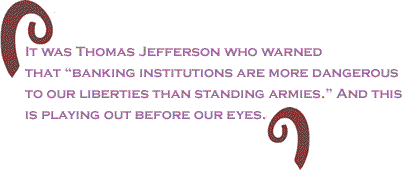
When the Federal government established the Troubled Asset Relief Program (TARP)
in 2008, the government later established the Making Home
Affordable (MHA) program. This was a program that was supposed
to assist home owners to stay in their homes. This program
has failed to assist home owners and the banks were able
to manipulate this federally supported program to ensure
that they were paid regardless of what was happening to
families in the midst of a depression. Because of the depth
of the depression,� and with hundreds of billions of delinquent
mortgage loans still on the books, banks are now trying
to recover whatever money they can by stepping up the foreclosure
process. �While a house may be worth substantially less
than the price it fetched four or five years ago, the banks
are anxious to repossess it and sell it for what they can
get, rather than eat the losses.�
It is this anxiety that led to the banks initiating foreclosure processes without
due respect to the law. The same securitization that allowed
the banks to bundle the mortgages and sell them off to money
management firms and to mutual funds meant that the banks
did not know who really owned the mortgages. Hence the whole
exercise of foreclosure reeked with fraud and what is called
robo-signing where� some mortgage servicers have been signing
off foreclosure documents without actually reading them,
or doing so without the presence of a notary. According
to the Washington Post, agents engaged to
check that foreclosure documentation was valid and complete
had been �signing off at a rate � 10,000 per month � where
they could not possibly have carried out the checks they
were required to do. One �expert� witness � Jeffrey Stephan
� claimed he�d been doing this for the past 5 years, while
acting for GMAC, J.P.Morgan Chase, and several other banks.�
Robo-signing is one more instance of fraud and malfeasance by the financial
oligarchy.
As early as 2007, Gretchen Morgenson of the New York Times was
writing that, �The pooling of home loans into securities
has been practiced for decades and helped propel real estate
prices in recent years as investors sought the higher yields
that such mortgage trusts could provide. Some $6.5 trillion
of securitized mortgage debt was outstanding at the end
of 2006.� Three years later she was still writing on the
recursive processes from securitization and wondering why
no one has been put behind bars for the actions of the banks
and mortgage companies. In a recent article entitled,� One
Mess that Cannot Be Papered Over,� She wrote that,
�LAWYERS representing delinquent homeowners have been shouting for years
about documentation problems in residential mortgages. Now
that their complaints have gained traction with investors,
attorneys general and some state court officials, the question
of consequences looms large. Is the banks� sloppy paperwork
a matter of simple technicalities that are relatively easy
to cure, as the banks contend? Or are there more far-reaching
consequences for banks and the institutions that bought
mortgage-backed securities during the mania? Oddly enough,
the answer to both questions may be yes. According to real
estate lawyers, most banks that have gotten into trouble
because they didn�t produce proper proof of ownership in
foreclosure proceedings can probably cure these deficiencies.
But doing so will be costly and time-consuming, requiring
banks to comb through every mortgage assignment and secure
proper signatures at each step of the way � and it surely
will take much longer than a few weeks, as banks have contended.�
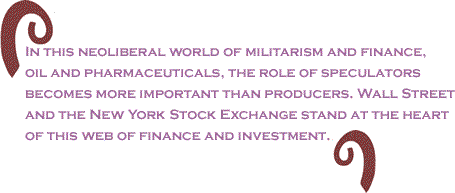
I have quoted extensively from the mainstream press because this was not being
written by a radical left writer. By the end of September
2010, the scandal of the documentation problems in the foreclosure
process was so widespread that several big banks declared
a full or partial moratorium on foreclosures. Bank of America
called a halt on proceedings across the US, while PNC Financial,
JPMorgan Chase and Ally Financial's GMAC Mortgage unit stopped
foreclosures in the 23 states where a judge must approve
all such proceedings. It was in the face of the widespread
fraud and abuse that 50 attorney generals in the US are
suing the banks for illegal foreclosure.
Even before the midterm elections gave the Republicans control of the House
of Representatives, Bank of America threw caution to the
wind and resumed foreclosures because if they did not appear
to be collecting, the bond holders would be calling in their
investments.
Home Ownership and Private Enterprise
The inherent conflict of interest between the role of the central bank and the
BlackRocks of the world has now been compounded with the
question about what is called law in the US. For centuries,
the idea of owning a home has been sacrosanct in the US.
This idea has been grounded in the so-called concept of
private property. Now the citizens of the US are faced with
whether the banks and the military are more important than
people owning their homes and guarding their property. It
is this major contradiction that is was played out in the
midterm elections in the US. The banks, the billionaires,
the oil companies, and the military wanted to ensure that
at all costs the depression is borne by the citizens of
the world and the poor in the USA. This is why in the midst
of the deepest depression in 70 years, the military budget
of the US increased while there were cuts in education,
health, and all other sectors of the society.
Unlike the last depression of the twentieth century, the rise of China, India,
Brazil and other centers of power outside of Frankfurt,
London, Paris and New York has created a new dynamic in
international politics. This means that the New York Fed
along with their allies in Britain, Germany, and France
cannot simply intensify the exploitation of Africa, Latin
America, and Asia. Within Europe, it is the British who
have taken the lead to intensify the oppression of the working
people in order to save the banks. In France, the workers
and the students have been mobilized to place the question
of the banks at the center of the political struggle. In
the US, the popular upsurge which led to the election of
Barack Obama is being consciously rolled back by the bankers,
the billionaires, and the militarists who do not want to
see black, white, brown, and Asian workers coming together.
Racism, Islamophobia, and anti-immigrant instigations have
been the tools to confuse the white working class so that
attention is turned away from the banks and the insurance
companies.
In the present midterm elections, one congressional representative sought to
raise the question by speaking about taxing billionaires.
In the elections, issues such as capital gains tax and stock
transfer taxes are not on the table, Representative Peter
DeFazio from Oregon (who was re-elected) raised the possibility
of bringing to the fore the taxes on sales of stocks. When
the rep put this out as part of his campaign, one capitalist
from Long Island was willing to contribute $150,000 to defeat
him. It is in New York where there is the highest concentration
of billionaires where no mainstream party has raised the
question of taxing the BlackRocks of this world. Howie Hawkins
of the Green Party has been the only politician bold enough
to raise the question of a stock transfer tax. This
would be a tax on gains from the stock market. One per cent
tax on stock profits in the state of New York could wipe
out the deficit of the state. But no politician in New York
from the mainstream party dares to raise this question.
Even some sections of the left media remain afraid of raising
this question.
There are so many front organizations for the billionaires that the citizens
do not know what is a genuine grass roots organization.
Citizens
United describes its mission as being dedicated to restoring
the United States government to "citizens' control"
and to "assert American values of limited government,
freedom of enterprise, strong families, and national sovereignty
and security." It is this organization that brought
a case before the Supreme Court of the USA .The
new ruling passed by the Supreme Court allows unlimited
contribution by capitalists to win elections.
US decline and the future of the dollar
In the film, Capitalism: A love Story, there is the scene where
Michael Moore goes to the headquarters of Goldmans Sachs
to carry out a citizen�s arrest of Blankfein and the other
executives of this bank. The intent, through the medium
of entertainment was to lift the consciousness of the US
workers to the crimes that were being committed by the bankers
who were too big to fail. Bernard Madoff was made a sacrificial
lamb while the other big sharks are still in the waters
of speculation and militarism. This failure of finance,
insurance and real estate as the basis for economic recovery
is now compounded by the reality that every day as the foreclosure
crisis continues, not only will millions in the USA lose
their homes, but many countries who have been keeping their
reserves in the US dollar will find that their foreign reserves
are worthless. This merging of the financial crisis in the
USA with the crisis for the dollar poses a great danger
to the world economy and it is not a matter if countries
will delink from the dollar, but when.
The financial oligarchs understand this and hence the necessity for the military
buildup for US hegemony, regardless of the cost to humans
everywhere.
 All
of this is to say that the extreme conservatism that is
being witnessed in the US today is not simply the result
of the racist reflex by poor whites, but part of the conscious
manipulation by the media moguls along with Wall Street
barons and those that have insatiable appetite for militarism
to confuse the people. The rhetoric has been retched up
so high that incidents of violence reported in the campaign
is only a harbinger of more serious confrontations to come
if measures are not taken to educate the people that their
economic woes are caused by the fraud and criminal activities
of the banks and the glorified financial oligarchs. Barack
Obama has been campaigning but his campaign will be meaningless
as long as he elevates people such as Tom Donilon to be
the National Security Adviser. Donilon has footprints in
the mortgage business. According to Robert Scheer, �As the
chief lobbyist for Fannie Mae from 1999 to 2005, Tom Donilon
was far more intimately involved than Paulson in the manufacturing
of this financial and mortgage mess. He successfully pressured
Congress to give Fannie Mae the green light to speed past
any sound regulation,� In a democratic� and accountable
society Tom Donilon would be investigated and cast out of
public service but such is the quality of persons that Obama
choose to advise him on National Security. All
of this is to say that the extreme conservatism that is
being witnessed in the US today is not simply the result
of the racist reflex by poor whites, but part of the conscious
manipulation by the media moguls along with Wall Street
barons and those that have insatiable appetite for militarism
to confuse the people. The rhetoric has been retched up
so high that incidents of violence reported in the campaign
is only a harbinger of more serious confrontations to come
if measures are not taken to educate the people that their
economic woes are caused by the fraud and criminal activities
of the banks and the glorified financial oligarchs. Barack
Obama has been campaigning but his campaign will be meaningless
as long as he elevates people such as Tom Donilon to be
the National Security Adviser. Donilon has footprints in
the mortgage business. According to Robert Scheer, �As the
chief lobbyist for Fannie Mae from 1999 to 2005, Tom Donilon
was far more intimately involved than Paulson in the manufacturing
of this financial and mortgage mess. He successfully pressured
Congress to give Fannie Mae the green light to speed past
any sound regulation,� In a democratic� and accountable
society Tom Donilon would be investigated and cast out of
public service but such is the quality of persons that Obama
choose to advise him on National Security.
Obama is not only trapped in the midst of financial oligarchs turned advisers,
by their counsel, he is consciously serving the interests
of the corporate fraudsters. Obama genuinely believes that
saving the fraudsters will save the US economy. It is this
misguided liberal belief that can only be clarified by a
mobilized and educated population.
The Obama administration finds itself in the midst of a transition. The transition
is torn between peace and war. Whether the reflex to war
and repression wins will depend on the extent to which the
peace and justice forces bring BlackRock and the shadow
government out in the open so that the fraudulent and speculative
system can give way to a new system that places human beings
at the center of the economy.

BlackCommentator.com Editorial Board Member, Dr. Horace Campbell,
PhD, is Professor of African American Studies and Political
Science at Syracuse University in Syracuse New York. He is the author of Barack Obama and Twenty-first Century Politics: A Revolutionary
Moment in the USA. Click here to contact Dr. Campbell. |

